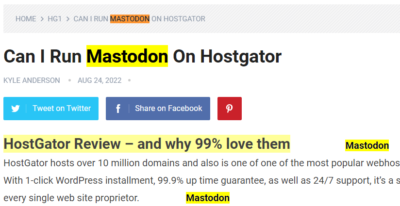Today I was reading about Twitter and some people mentioned Mastodon as an alternative. It is an interesting idea, basically letting users start their own social network platforms and setting up their own moderation rules. Then the users (and mostly the owner I would guess) enforce those rules instead of Mastodon employees, of which there are very few since it is nonprofit. The Wikipedia article seemed to imply that you could run your own server, so I wondered if I could run my own installation of Mastodon similar to WordPress. I kind of don’t think so because the users all sign up centrally though if you wanted them to start a new account just for your installation, maybe? There is a reason I don’t know the answer to this question.
I have been using Bing as my search engine so I can earn free movies (24 earned since May) and I searched for whether whether Hostgator supports Mastodon. I found a page at blackboxxdigital.com filled with a bunch of boilerplate about Hostgator trying to get you to sign up, posing as a review. Nothing even mentioned Mastodon despite the title of the page being “Can I Run Mastodon on HostGator?” So I did a search of the page looking for “Mastodon” to see if I had missed it. And it highlighted dozens of instances of Mastodon, previously invisible, but now highlighted in between paragraphs and at the end of lines. They were fooling the search engines into thinking the page was about Mastodon.

I listened to a podcast recently about ChatGPT, an artificial intelligence program that is said to be able to carry out lifelike chats with people. One of the demonstrations the reporters had it perform was write a short fictional story. You can also have it write essays about pretty much any subject and it either already knows or finds stuff out and gives that to you. I wonder how much paraphrasing it is doing vs. just plagiarizing, but the results sound decent. I’ve also noticed more and more really poorly written pseudoinformative web pages that give you paragraphs of uselessly broad information and almost nothing actually helpful, or maybe just one sentence at the end that is actually about what you want to know. I’ve seen a lot of pages that “review” a product by telling you about the features the sellers say it has and then saying it gets good reviews on Amazon. They haven’t necessarily even used the product. I don’t know that those articles are written by computers, but they will be. In fact ChatGPT could kill the internet, clogging it with tons of garbage pages that search engines will think is relevant to what people are looking for. It may sometimes even be of some use, but given how easy it will be for something like ChatGPT to write millions of web pages of garbage, that is the result that seems more likely. The people doing it won’t even need to understand the English that is being generated. Ugh. Bing isn’t as good as Google (in fact the page I found in Bing doesn’t appear in Google search results at all), and Google has been working around sneaky search engine optimization for years, but it is going to get a lot harder I think.

Who really wrote this post? And what have you done with my brother? my brother? What? [endif]
An AI search company could put Google out of business, if it didn’t need to feed advertising deception as Google does.
https://twitter.com/rasbt/status/1605201065674252288